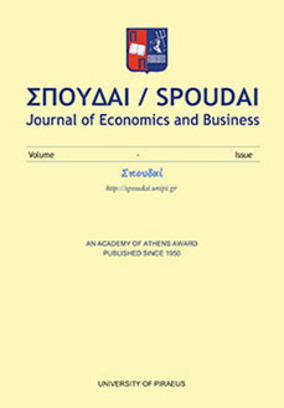Integrating information services for managing regulations in international maritime transportation
Part of : Σπουδαί : journal of economics and business ; Vol.63, No.3-4, 2013, pages 128-136
Issue:
Pages:
128-136
Abstract:
Nowadays, decision making in maritime transportation includes information for obligatory or not regulations related to quality, safety and security. Decisions of this nature have a significant effect on the actual cost of quality, safety and security in maritime transport. Although regulatory information is important, it is rather fragmented due to the internationalized nature of maritime operations as well as because it involves various private and public sector standardization agencies. In that respect, the development of an integrated maritime information service is essential in order to reduce costs and in turn improve maritime transportation services, streamline the flow of commerce as well as aid in developing better international, regional and national schemes. This paper initially provides two methodologies for estimating the cost of quality/safety/security and thereafter discusses the importance of managing regulatory material and information. Thereafter, a review of the literature is taking place and some innovative initiatives are presented, e.g. the “Maritime Knowledge Centre” of International Maritime Organization (IMO). Finally, a rationale will be proposed for the development of an integrated information service in order to provide a suitable and reliable information-knowledge based framework for quality, safety and security in maritime transportation. The implications resulting from the development of such a framework is discussed together with its significance for managing the relevant information.
Subject (LC):
Keywords:
information services, maritime transport, quality, safety, security, regulations, standards
Notes:
Περιέχει διάγραμμα και βιβλιογραφία, Special Issue: Management of maritime safety, security and environmental protection
References (1):
- Bichou, K., 2004. The ISPS Code and The Cost of Port Compliance: An Initial Logistics and SupplyChain Framework for Port Security Assessment and Management, Maritime Economicsand Logistics, 6:322-348.Celik, M., 2009. Designing of integrated quality and safety management system (IQSMS) for shipping operations. Safety Science, 47(5): 569-577.Chlomoudis, C., Kostagiolas, P.A. and Merikas, A., 2009. The Significance of Intangible Assetsfor the Management of New Port Services Industry, International Journal of Trade in Services,1(1):43-51.Crosby, P.B., 1979. Quality Is Free, McGraw-Hill, New York.Everett, S., 2003. Corporatization: A legislative framework for port inefficiencies, Maritime policyand management, 30(3):211-219.Fafaliou, I., Lekakou, M. and Theotokas, I., 2006. Is the European shipping industry aware of corporatesocial responsibility? The case of the Greek-owned short sea shipping companies, MarinePolicy, 30(4):412-419.Feigenbaum, A.V., 1956. Total quality control, Harvard Business Review, 34(6):93-101.Hwang, G.H. and Aspinwall, E.M., 1996. Quality Cost Models and their Application - A Review,Total Quality Management, 7(3):267-281.Knapp, S. and Franses, P.S., 2007. Comprehensive Review of the Maritime Safety Regimes: PresentStatus and Recommendations on improvement, Econometric Institute, Erasmus UniversityRotterdam, Econometric Institute Report 2007-19, http://publishing.eur.nl/ir/repub/asset/ 10097/ EI+Working+Paper+2007-19.pdf Kostagiolas, P.A. and Chlomoudis, C., 2011. Quality and safety management in maritime industry:The role of information services for the maritime economy, Athens: Papazisis publications(in Greek).Kristiansen, S., 2005. Maritime transportation: safety management and risk analysis, Elsevier Butterworth-Heinemann,Oxford, U.K.Lambrou, M.A., Nikitatos, N. and Pallis, A.A., 2004. Advanced Information and CommunicationTechnologies in support of Ports Integration in Logistics Systems. Proceedings of the InternationalConference on Logistics, pp. 189-198, Izmir.Masser, W.J., 1957. The quality manager and quality cost, Industrial quality control, 14:5-8.Massingham, P., 2010. Knowledge risk management: a framework, Journal of Knowledge Management,14(3):464-485.Pantouvakis, A. and Dimas, A., 2010. Does ISO 9000 Quality Management System matters in thecompany performance? Evidence from the shipping industry, Maritime Policy and Management,36 (5):505-522.Psaraftis, H.N., 2008. Environmental Risk Evaluation Criteria, WMU Journal of Maritime Affairs,7(2):409-427.Psaraftis, H.N., 2002. Maritime Safety: to be or not to be proactive, WMU Journal of Maritime Affairs, 1:3-16.Psaraftis, Η.Ν., 2006. Maritime safety in the post-Prestige era, Marine Technology, 43(2):85-90.Stasinopoulos, D., 2003. Maritime Security- The Need for a Global Agreement, Maritime Economicsand Logistics, 5:311-320.Tzannatos, Ε. and Kokotos, D., 2009. Analysis of accidents in Greek shipping during the pre- andpost-ISM period, Marine Policy, 33(4):679-684.




